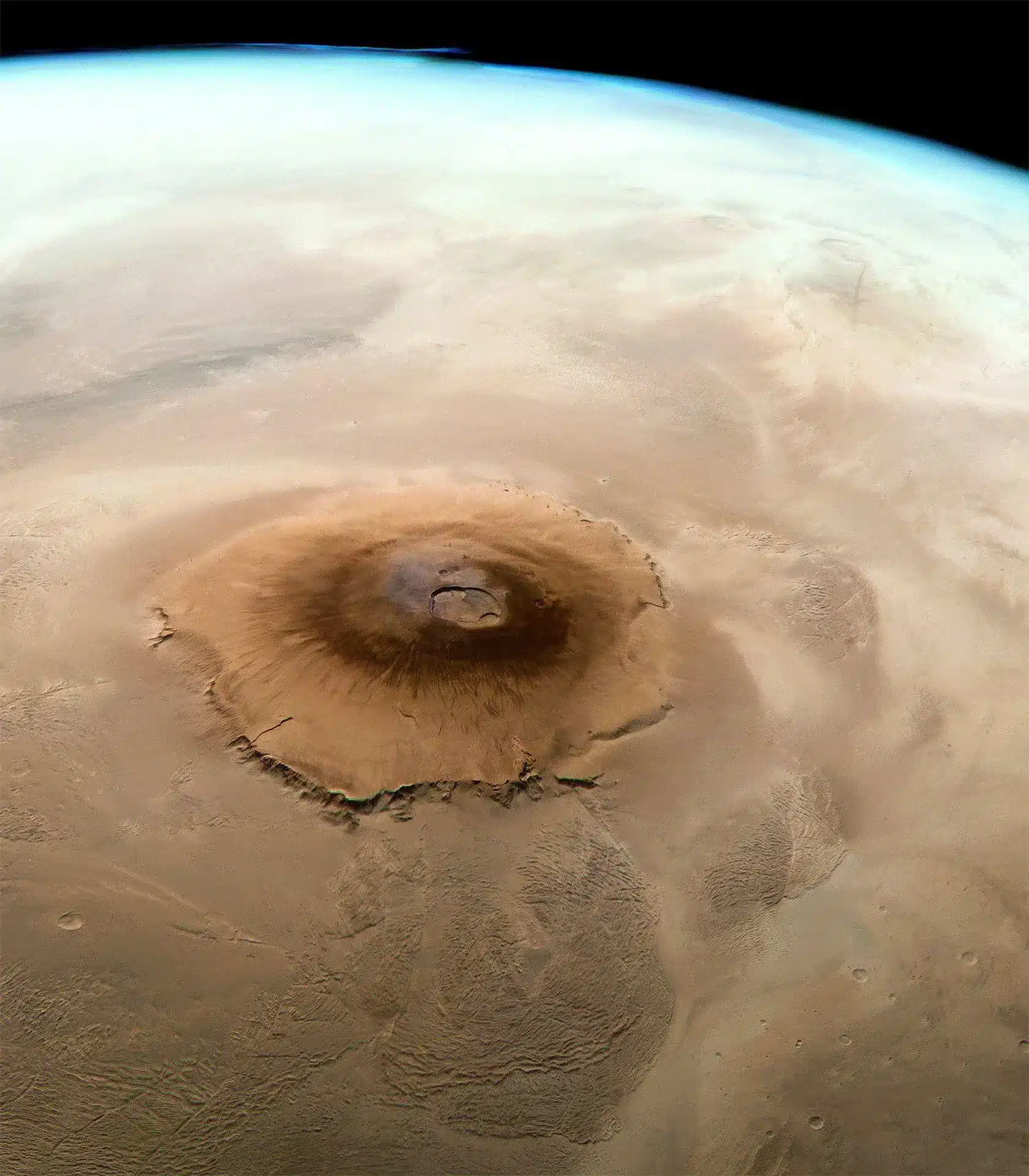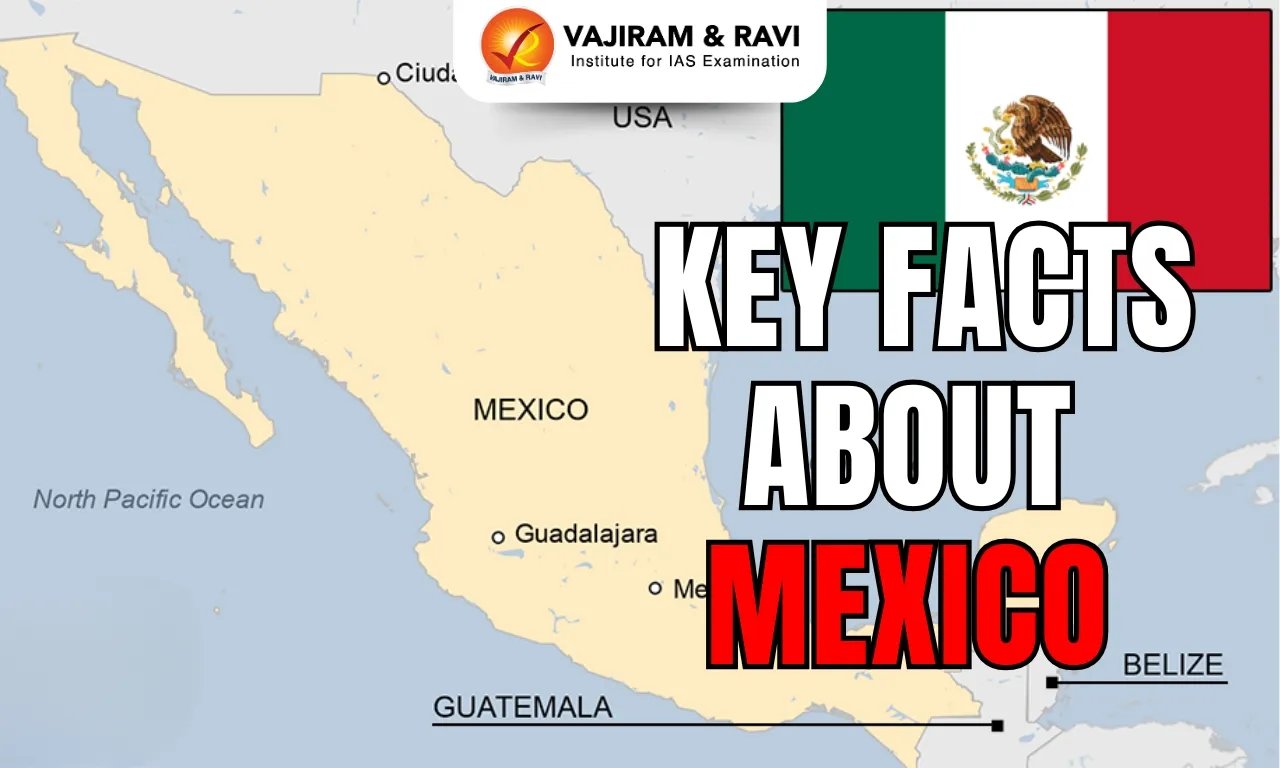About Olympus Mons:
- It is a shield volcano located in Mars’ western hemisphere.
- It is the highest point on Mars and the largest known volcano in the solar system.
- It is 16 miles (24 kilometers) high, which makes it about three times higher than Mt. Everest.
- It is also very wide (340 miles or 550 kilometers) and covers an area larger than the entire chain of Hawaiian Islands.
- In contrast, the largest volcano on Earth, Hawaii’s Mauna Loa, is 120 kilometers across and 9 kilometers high.
- It is some 3.5 billion years old, which means the volcano formed early on in Mars’ history.
- It is a very flat mountain which slopes by only 2 to 5 degrees.
- Its summit is marked by a caldera, a large depression formed by volcanic activity, spanning 50 miles (80 kilometers) wide.
- The summit caldera consists of several overlapping pits. These pits were created by different eruptive phases.
- In contrast, many Earth-based volcanoes typically feature a single, less complex caldera.
Key Facts about Shield Volcano:
- They are the largest volcanoes on Earth.
- They do not form soaring mountains with conical peaks like composite volcanoes. Instead, they are broad volcanoes with gentle slopes.
- They are almost exclusively basalt, a type of lava that is very fluid when erupted.
- Because basalt has a low viscosity, it can flow on the surface better. So, when these types of volcanoes erupt, lava flows outwards at large distances.
- They are built by repeated eruptions that occurred intermittently over vast periods of time.
- Eruptions at shield volcanoes are only explosive if water somehow gets into the vent; otherwise, they are characterized by low-explosivity fountaining that forms cinder cones and spatter cones at the vent.
The Hawaiian shield volcanoes are the most famous examples.
Q1: What is Frost?
Frost is water vapor, or water in gas form, that becomes solid. Frost usually forms on objects like cars, windows, and plants that are outside in air that is saturated, or filled, with moisture.
Source: 1,50,000 tonnes of water frost found on Mars’ tallest volcano: What it means
Last updated on December, 2025
→ Check out the latest UPSC Syllabus 2026 here.
→ Join Vajiram & Ravi’s Interview Guidance Programme for expert help to crack your final UPSC stage.
→ UPSC Mains Result 2025 is now out.
→ UPSC Notification 2026 is scheduled to be released on January 14, 2026.
→ UPSC Calendar 2026 is released on 15th May, 2025.
→ The UPSC Vacancy 2025 were released 1129, out of which 979 were for UPSC CSE and remaining 150 are for UPSC IFoS.
→ UPSC Prelims 2026 will be conducted on 24th May, 2026 & UPSC Mains 2026 will be conducted on 21st August 2026.
→ The UPSC Selection Process is of 3 stages-Prelims, Mains and Interview.
→ UPSC Result 2024 is released with latest UPSC Marksheet 2024. Check Now!
→ UPSC Prelims Result 2025 is out now for the CSE held on 25 May 2025.
→ UPSC Toppers List 2024 is released now. Shakti Dubey is UPSC AIR 1 2024 Topper.
→ UPSC Prelims Question Paper 2025 and Unofficial Prelims Answer Key 2025 are available now.
→ UPSC Mains Question Paper 2025 is out for Essay, GS 1, 2, 3 & GS 4.
→ UPSC Mains Indian Language Question Paper 2025 is now out.
→ UPSC Mains Optional Question Paper 2025 is now out.
→ Also check Best IAS Coaching in Delhi

















